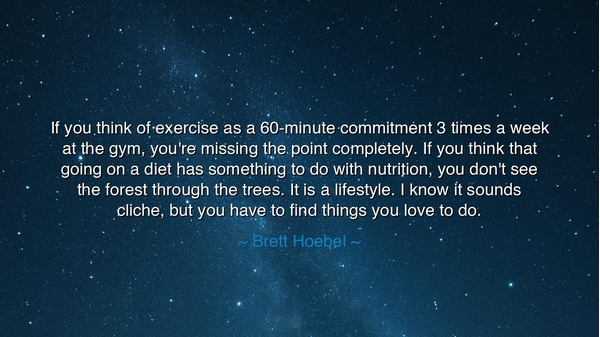
If you think of exercise as a 60-minute commitment 3 times a week
If you think of exercise as a 60-minute commitment 3 times a week at the gym, you're missing the point completely. If you think that going on a diet has something to do with nutrition, you don't see the forest through the trees. It is a lifestyle. I know it sounds cliche, but you have to find things you love to do.






Hear, O children, the wisdom of Brett Hoebel, who speaks not only of the body but of the spirit: "If you think of exercise as a 60-minute commitment 3 times a week at the gym, you're missing the point completely. If you think that going on a diet has something to do with nutrition, you don't see the forest through the trees. It is a lifestyle. I know it sounds cliche, but you have to find things you love to do." In these words, Hoebel uncovers a truth that the ancients have always known—that health and well-being are not about rigid rules and fleeting efforts, but about a continuous, joyful engagement with life itself. It is not enough to dedicate just moments here and there to the body; the body, like the soul, requires constant care, joy, and purpose.
In the ancient world, great leaders and philosophers understood that true health did not come from sporadic effort, but from a life lived in balance and discipline. Socrates taught that the path to wisdom required more than occasional acts of contemplation; it was a lifetime’s commitment to self-examination and growth. So too did the Spartans—those fierce warriors of ancient Greece—understand that their strength came not from occasional bouts of exercise, but from a life that revolved around discipline, movement, and purpose. They did not seek fitness for an isolated goal; they lived it every day. Brett Hoebel’s words echo this same wisdom, reminding us that to live a life of true vitality, we must integrate movement, nutrition, and joy into every corner of our existence.
Consider the example of Alexander the Great, whose conquests spanned continents. His life was one of relentless physical and mental discipline, yet it was not just the campaigns that defined him—it was his commitment to his routine and lifestyle. Alexander trained his body daily, honed his mind with study, and cultivated his community of warriors and philosophers who shared in his journey. His strength lay not in the isolated act of a single battle, but in his lifestyle—a life built on the consistent pursuit of health, purpose, and connection. Hoebel’s insight that exercise and diet are not mere tasks to check off, but part of an all-encompassing lifestyle, mirrors this principle, showing that true vitality comes from embracing life’s challenges with passion and joy.
The ancient Romans, too, understood that the body was not a machine to be worked and fed only for a short period, but a vessel to be nurtured throughout life. The great emperor Marcus Aurelius, though burdened with the weight of ruling an empire, was known for his commitment to both mental and physical wellness. His routines, though demanding, involved regular exercise, careful nutrition, and time for rest. For Aurelius, the body and mind were intertwined, and true greatness came from living a balanced life, where work and rest, discipline and pleasure, were all part of a greater whole. Hoebel’s advice that exercise and diet are not separate tasks but a lifestyle fits this ancient wisdom—our actions must flow into every aspect of life, creating a rhythm that sustains us, rather than fleeting efforts that exhaust us.
In the modern world, we often mistake health for a series of actions rather than a continuous state of being. We think that the mere act of going on a diet or working out a few times a week will suffice. Yet, as Brett Hoebel rightly points out, this mindset misses the true point of well-being. It is not about an isolated act, but about the integration of joy, movement, and purpose into the fabric of our lives. A diet is not a temporary restriction, but a commitment to nourish ourselves with foods that sustain us—whole, natural, and full of life. Exercise is not a task but a celebration of the body’s ability to move, to dance, to play, and to grow stronger.
The lesson here, O children, is profound. Health is not something we can achieve in isolated moments of effort, nor is it something that can be measured by temporary sacrifices. Health is a lifestyle—a lifelong commitment to movement, to joy, to nourishment, and to connection. Brett Hoebel’s wisdom is a reminder that we must not live in pursuit of perfection but in pursuit of wholeness. It is not enough to exercise because we fear illness or to diet because we wish to conform to a standard. We must find what we love, whether it be movement, food, or connection, and live with that passion every day.
So, O children, take this wisdom to heart. Make health your lifestyle, not your burden. Find joy in the foods you eat, in the movements you make, and in the relationships you cultivate. Do not treat your body as a machine to be fixed, but as a vessel to be nurtured, honored, and celebrated. Just as the ancients lived with purpose, joy, and balance, so too must we, embracing the fullness of life and living it fully with passion, intention, and grace.






AAdministratorAdministrator
Welcome, honored guests. Please leave a comment, we will respond soon